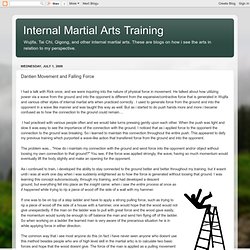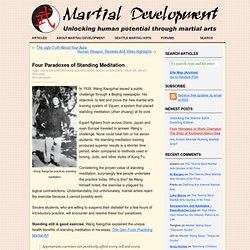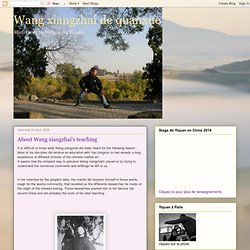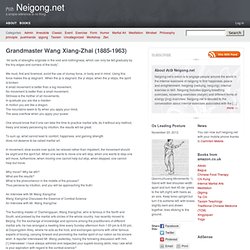

Integral Ch’uan Institute » Workshops. Dantien Movement and Falling Force. I had a talk with Rick once, and we were inquiring into the nature of physical force in movement.

He talked about how utilizing power via a wave from the ground and into the opponent is different from the expansive/contractive force that is generated in Wujifa and various other styles of internal martial arts when practiced correctly . I used to generate force from the ground and into the opponent in a wave like manner and was taught this way as well. But as i started to do push hands more and more i became confused as to how the connection to the ground could remain.... I had practiced with various people often and we would take turns pressing gently upon each other. When the push was light and slow it was easy to see the importance of the connection with the ground. The problem was... Ground, but everything fell into place as the insight came: when i saw the entire process at once as it happened while trying to rip a piece of wood off the side of a wall with my hammer. through a door. Four Paradoxes of Standing Meditation. Wang Xiangzhai practices standing meditation In 1939, Wang Xiangzhai issued a public challenge through a Beijing newspaper.

His objective: to test and prove the new martial arts training system of Yiquan, a system that placed standing meditation (zhan zhuang) at its core. Expert fighters from across China, Japan and even Europe traveled to answer Wang’s challenge. None could beat him or his senior students. His standing meditation training produced superior results in a shorter time period, when compared to methods used in boxing, Judo, and other styles of Kung Fu.
Considering the proven value of standing meditation, surprisingly few people undertake the practice today. Sincere students, who are willing to suspend their disbelief for a few hours of introductory practice, will encounter and resolve these four paradoxes. Standing still is good exercise. Holding your arms up is relaxing. After a few weeks of regular practice, the soreness will give way to more pleasant sensations. About Wang xiangzhai's teaching. It is difficult to know what Wang xiangzhai did really teach for the following reason : Most of his disciples did receive an education with Yao zongxun or had already a long experience of different schools of the chinese martial art.

It seems that the simplest way to perceive Wang xiangzhai's yiquan is by trying to understand the numerous comments and writtings he left to us. In his interview by the people's daily, the master did express himself in those words, rough for the wushu community, that reveilled us the differents researches he made on the origin of the chinese boxing. Those researches pushed him to his famous trip around China and are probably the roots of his later teaching. "To extend" (qiba) for beeing "one with the universe" Grandmaster Wang Xiang-Zhai (1885-1963) “All sorts of strengths originate in the void and nothingness, which can only be felt gradually by the tiny edges and corners of the body”.

We must, first and foremost, avoid the use of clumsy force, in body and in mind. Using this force makes the qi stagnant. When the qi is stagnant, the yi stops; when the yi stops, the spirit is broken. A small movement is better than a big movement, No movement is better than a small movement, Stillness is the mother of all movements. In quietude you are like a maiden In motion you are like a dragon. One should know that if one can take the time to practice martial arts, do it without any method, freely and slowly perceiving by intuition, the results will be great. To sum up, what cannot lead to comfort, happiness, and gaining strength does not deserve to be called martial art.
In movement, slow excels over quick, be relaxed rather than impatient, the movement should be slight and the spirit full. Why move? A few days ago, Mr. Yiquan. Yi quan, also known as Dacheng quan, is a martial art system founded by the Chinese Xingyiquan master Wang Xiangzhai (王薌齋). History[edit] YiChuan, "Yi" meaning Intent, (but not intention), "Chuan" meaning to grasp that which has been scattered. Having studied Xingyiquan with Guo Yunshen in his childhood,[1] Wang Xiangzhai travelled China, meeting and comparing skills with masters of various styles of kung fu.[1] In the mid-1920s, he came to the conclusion that Xingyiquan was often taught wrong,[citation needed] with too much emphasis on 'outer form', neglecting the essence of true martial power.
[citation needed] He started to teach what he felt was the true essence of the art using a different name, without the 'xing' (form).